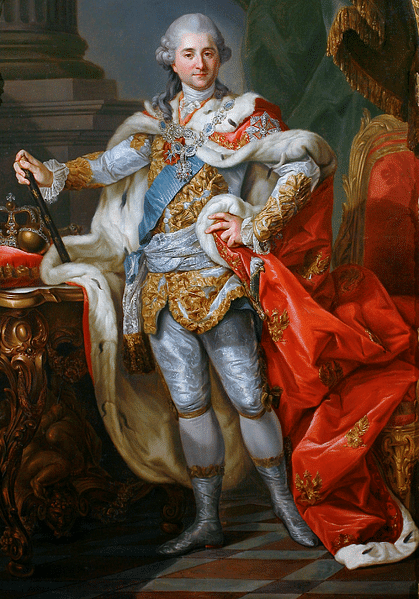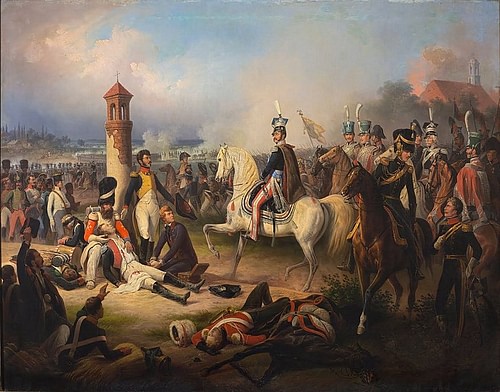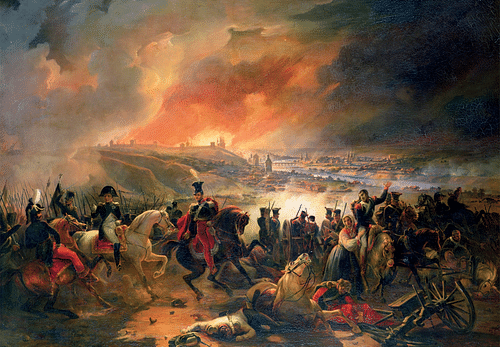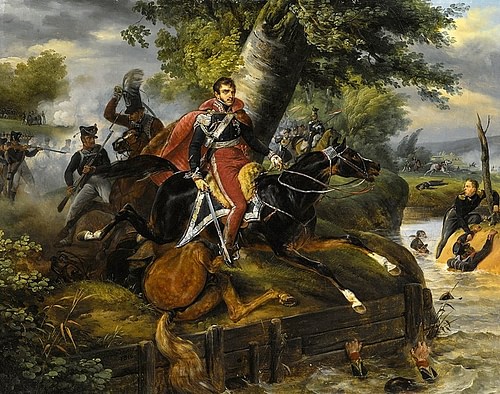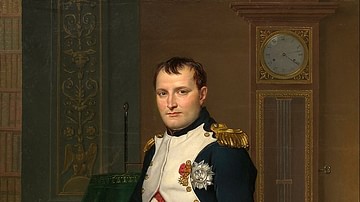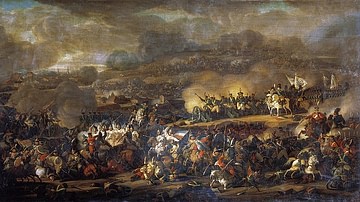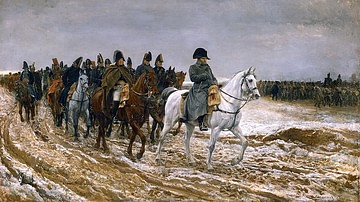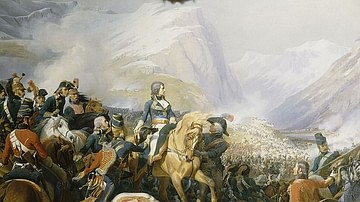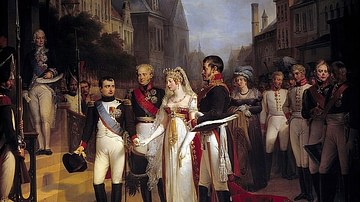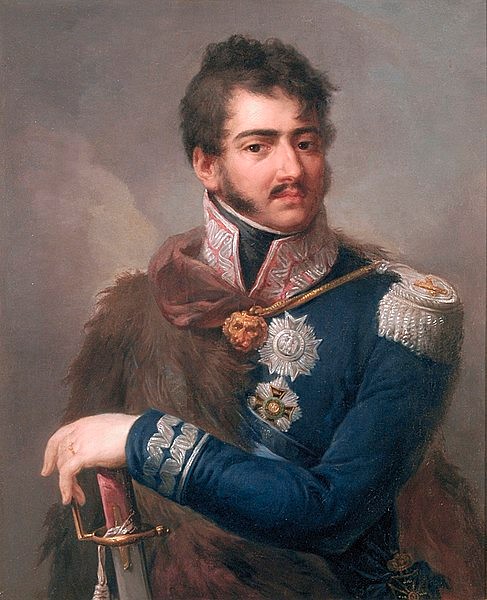
Prince Józef Poniatowski (1763-1813) was a Polish soldier and patriot, who served as commander-in-chief of the Polish army during the Napoleonic Wars (1803-1815). A steadfast ally of French Emperor Napoleon I (r. 1804-1814; 1815), Poniatowski was named a marshal of the French Empire only days before he was killed at the Battle of Leipzig.
A nephew of the last Polish king, Poniatowski served in the Polish army and fought against invaders during the Polish-Russian War of 1792 and the Kościuszko Uprising of 1794. After Polish sovereignty was erased by the three Partitions of Poland, Poniatowski aligned himself with Napoleon and was appointed minister of war of the Grand Duchy of Warsaw, a French client state created from Polish lands. Though Poniatowski neither liked nor trusted Napoleon, he viewed an alliance with France as the best way to restore Poland's autonomy and became one of Napoleon's staunchest supporters. In 1809, he led the Poles to victory against the Austrians and doubled the size of the Duchy of Warsaw. Three years later, he led the Polish corps of the Grande Armée in Napoleon's invasion of Russia and fought with distinction at the Battle of Borodino.
On 15 October 1813, Poniatowski was made a marshal of the French Empire, the only non-Frenchman to receive the honor. Only four days later, he was killed while commanding the French rearguard at the end of the Battle of Leipzig (16-19 October 1813). Brave, melancholic, and sensitive to personal honor, Poniatowski became a Polish national hero and an inspiration for future generations of Polish patriots.
Early Life
Józef Antoni Poniatowski was born in the Palais Kinsky in Vienna, Austria, on 7 May 1763. His father, Andrzej Poniatowski, was a Polish nobleman who had spent his career as an officer in the Austrian army, attaining the rank of Austrian Field Marshal in 1771. Józef's mother, Countess Maria, was a member of the distinguished Czech-Italian aristocratic family of Kinsky and served as a lady in the court of the Habsburg Empress Maria Theresa (r. 1740-1780). Józef, therefore, already enjoyed a prestigious lineage on both sides of his family, but his position was elevated further when his paternal uncle, Stanislaus Augustus Poniatowski, was elected King of Poland a year after Józef's birth. Taking the regnal name Stanislaus II Augustus (r. 1764-1795), the new king made all his brothers hereditary princes.
In 1773, Józef's father died, and King Stanislaus took over the guardianship of his nephew. Stanislaus arranged for a team of tutors to educate Józef, particularly in history and military affairs. The young prince was tutored in French but also spoke German and Russian; though he was not taught his native Polish, he nevertheless picked up the language from the courtiers. Indeed, Józef's education in the Polish language was probably encouraged by the king himself, who wanted his nephew to embrace his Polish ancestry. The First Partition of Poland of 1772 had seen Russia, Prussia, and Austria deprive Poland of a third of its lands and population, while what remained of the Polish state became little more than a Russian puppet. This led to radical nationalism and unrest in Poland. As a king beholden to Empress Catherine the Great of Russia (r. 1762-1796), Stanislaus' hands were tied on the issue, but he secretly hoped that his young nephew would one day take up the Polish cause.
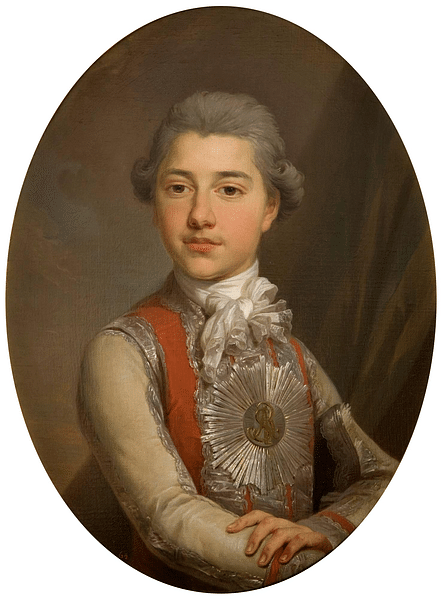
In 1780, Józef Poniatowski enlisted as an officer in the Austrian army. He quickly rose through the ranks; by 1786, he was a lieutenant colonel in a Light Horse Regiment and soon became aide-de-camp to Joseph II, Holy Roman Emperor (r. 1765-1790). Though his proficiency in infantry and artillery tactics left much to be desired, Poniatowski proved to be an excellent cavalry officer and seemed to take pleasure in training new recruits. He would get his first taste of combat in 1788, during the Austro-Turkish War, when he was severely wounded while leading an infantry column at the Battle of Šabac on 24 April. Though the wound was life-threatening, Poniatowski recovered by November and was promoted to full colonel for his valor. During his time in the Austrian army, Poniatowski also completed diplomatic missions on behalf of his uncle. He represented Poland at the funeral of Maria Theresa in 1780 and accompanied King Stanislaus on a mission to Kyiv in 1787 to meet with Catherine the Great. Yet as the clouds of unrest gathered over Poland, Poniatowski would soon find that he was destined for higher service to his ancestral land.
In the Service of Poland
By 1788, Russia had become embroiled in two wars, against the Swedes on one front and the Ottomans on the other. For the Polish patriots who dreamt of casting off Russian dominance, this was the perfect opportunity. In October, a diet of Polish nobles denounced Russian rule and called for a new army of 100,000 men to be raised. This army needed officers to train it, and King Stanislaus summoned his nephew back to Poland for this purpose. Poniatowski was hesitant to leave the service of Emperor Joseph, but ultimately prioritized his loyalty to Poland over his obligations to Austria. He arrived in Warsaw in October 1789 and was made a major general, given command of a division in Ukraine. Poniatowski found the men under his new command to be lacking in training, discipline, and supplies. He did his best to rebuild the army but relished any opportunity to visit Warsaw, where he was often found mingling amongst high society, drinking, and womanizing.
On 3 May 1791, the king and a group of patriotic Polish nobles proclaimed a new, liberal constitution that featured Enlightenment Age principles and was modeled on the ideals of the concurrent French Revolution (1789-1799). This alarmed Catherine of Russia, who had no desire to see French revolutionary radicalism brought to her doorstep. In April 1792, Catherine goaded several conservative Polish and Lithuanian noblemen into forming the Confederation of Targowice, which denounced the new constitution and pleaded for Russian intervention. The Russians invaded Poland the following month.
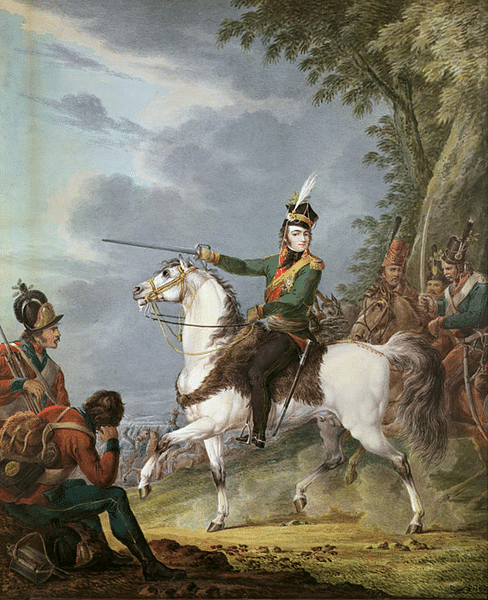
Tasked with the defense of Ukraine, Poniatowski's division lacked training, weapons, food, and clothing. Moreover, the prince had only 20,000 undisciplined and raw recruits under his command, and was faced with 60,000 battle-hardened Russians. Poniatowski initially concentrated his army in a fortified camp at Polona but was forced to withdraw once the Russians commenced a flanking maneuver. The pleas he sent to his uncle for more men and supplies went unanswered, and it appeared that Poniatowski's division was doomed. Then, on 18 June 1792, Poniatowski won his first victory, defeating a Russian column at the Battle of Zieleńce. Although Poniatowski was unable to exploit his victory by destroying the column, it was still a much-needed success that inspired confidence in the Polish troops.
Poniatowski barely had time to bask in his victory before word reached him that King Stanislaus had accepted the demands of the Confederation of Targowice, abolishing the constitution and resubjecting Poland to Russian dominance. Poniatowski was furious and even considered kidnapping his uncle in a coup d'état but decided against it out of family loyalty. He resigned from the Polish army out of protest on 30 July and published a pamphlet promising revenge on the Russians. For this, he was banished from Poland.
Kościuszko Uprising
Poniatowski went into exile in Vienna, forced to watch as Poland was partitioned for a second time between Russia and Prussia in 1793. In 1794, a group of disgruntled Polish patriots led by Tadeusz Kościuszko launched an insurrection against Russian influence. Poniatowski accepted an invitation to command a division in defense of Warsaw and successfully fended off an initial Prussian offensive. In August, the Prussians launched a surprise night attack that overwhelmed and defeated Poniatowski's troops. Poniatowski resigned his command and was relegated mostly to reconnaissance work. In November, Russian General Alexander Suvorov stormed the fortress of Praga, and his troops massacred anywhere between 10-20,000 Poles. As Suvorov himself reported, "the whole of Praga was strewn with dead bodies, blood was flowing in streams" (Doyle, 208).
The revolt ended shortly after Praga's fall. Poland was partitioned for a third and final time in 1795 and was erased from the map of Europe. King Stanislaus was forced to abdicate on 25 November 1795 and would die of a stroke less than three years later. As for Poniatowski, his Warsaw estates were confiscated after he refused to serve in the Russian army. He fled to Vienna once again, where he stayed until Empress Catherine's death in 1796. Upon returning to Warsaw, Poniatowski would spend the next decade carousing and womanizing; although he never married, he fathered two sons by his mistresses. During this time, Poniatowski stayed out of active politics, though he remained an ardent Polish patriot and longed to see Poland's restoration.
Duchy of Warsaw
As the prince was enjoying the social life of Warsaw, Europe was becoming swept up in the Napoleonic Wars. The chaos of the French Revolution had led to the rise of Napoleon Bonaparte (1769-1821), a Corsican-born French general who first seized power in the Coup of 18 Brumaire in 1799 and proclaimed himself emperor of the French in 1804. Napoleon led the French army to victory in battle after battle, beating the Austro-Russians at the Battle of Austerlitz (2 December 1805) and the Prussians at the Battle of Jena-Auerstedt (14 October 1806). The popular perception of Napoleon as a champion of revolutionary ideals led many Polish patriots to hope that he would be the one to liberate their country.
In December 1806, French forces under Marshal Joachim Murat reached Warsaw and were greeted with great fanfare by the Poles. Poniatowski personally welcomed Murat to the city, gifting the French marshal with the sword of Stephen Báthory, a 16th-century king of the Polish–Lithuanian Commonwealth. Murat was charmed with Poniatowski, but this enthusiasm was not shared by Napoleon himself. The emperor was unimpressed with Poniatowski's military record, dismissing him as "an inconsequential lightweight" of little talent or value (de Lee, 425). Despite this, Napoleon appointed Poniatowski as minister of war for the Grand Duchy of Warsaw after its creation in July 1807. The Duchy of Warsaw was a French client state created from Polish lands and was seen by many as the first step toward a reconstituted Poland. However, Napoleon's decision to give the duchy over to the rule of the King of Saxony, rather than to a native Pole, caused Poniatowski to feel betrayed. From then on, although he continued to support Napoleon, he would never fully trust him.
Galician Campaign
In October 1807, Poniatowski became commander-in-chief of the Polish army and wasted no time reforming it. He imposed conscription, founded engineering and artillery schools, and retrained his infantry using French tactics, although he devised the cavalry tactics himself. His new army would soon be put to the test when Austria declared war on France in April 1809, kicking off the War of the Fifth Coalition. While the main armies of France and Austria slugged it out along the Danube, Archduke Ferdinand of Austria led 32,000 troops in an advance toward Warsaw. Taken by surprise, Poniatowski could only scrounge together 17,000 men to oppose the Austrian attack. On 17 April, the two armies clashed at the bloody Battle of Raszyn, where the Poles were outflanked and forced to retreat. The defeat at Raszyn made Warsaw indefensible, and Poniatowski was forced to allow the Austrians to occupy it.
Despite this setback, Poniatowski was encouraged by the conduct of his troops, who held out against a superior force for a long time. He decided to launch a counteroffensive against Austrian-occupied Galicia, seizing the fortress of Sandomierz on 19 May and occupying Zamość the next day. By the end of May, most of Galicia had fallen under Polish control; alarmed, Archduke Ferdinand was forced to give up Warsaw in order to retake Galicia. The Austrians were unable to catch the Polish army, which swelled every day with new, patriotic recruits. In late July, Poniatowski entered Krakow and was hailed as a Polish national hero. By the time the war ended a few months later, Poniatowski's conquests had doubled the size of the Duchy of Warsaw. Napoleon realized he had gravely underestimated the prince and sent him a saber of honor to celebrate his campaign.
Invasion of Russia
By 1810, Franco-Russian relations had begun to deteriorate, partially over the issue of the Duchy of Warsaw. Tsar Alexander I of Russia (r. 1801-1825) viewed the duchy's existence as a threat to Russia's security and demanded that Napoleon sign a pledge that he would not restore Polish sovereignty. Napoleon's refusal was one of the factors that led to the French invasion of Russia in June 1812. The war was enthusiastically supported in Poland, with many patriots viewing it as a war of liberation. Over 100,000 Polish soldiers served in Napoleon's Grande Armée during the Russian campaign, making up the largest non-French demographic of the invasion force. Many of these Polish troops were organized into the V Corps and placed under Poniatowski's command.
As Napoleon's 615,000-man army crossed the Niemen River and advanced into Russian territory, the Russian armies began to retreat; the tsar's generals planned to wage a war of attrition by avoiding battle and luring the French army deep into Russian territory. By late July, the Grande Armée had lost over 100,000 men to disease and desertion. The V Corps was worn down by ineffective forced marches through the blistering summer heat, engaged in desperate gambits to pin down the Russians and force them to fight. Battle was finally joined at Smolensk (16-18 August), where the Poles were involved in some of the most brutal parts of the fighting. At the Battle of Borodino (7 September), Poniatowski's corps fought a day-long struggle for the Utitsa Mound and were unable to prevail until sunset. Poniatowski's Poles were amongst the first to enter Moscow on 14 September; by this point, disease and battle casualties had reduced the V Corps to a strength of barely 5,000 men.
After realizing his position in Moscow was untenable, Napoleon ordered a retreat on 18 October. Pursued by the Russian army and plagued by disease and poor weather, the Grande Armée was practically destroyed during the retreat. Poniatowski suffered an injury when he fell from his horse and had to ride in a carriage the rest of the way. He was often observed to weep when watching the suffering of his soldiers. Less than 100,000 survivors of the Grande Armée recrossed the Niemen in early December. Poniatowski was in Warsaw by Christmas, where he reviewed the bloodied remnants of V Corps. Depressed at the failure of the war of liberation, Poniatowski blamed himself for the loss and became suicidal.
Marshal's Baton & Death
In the spring of 1813, Russia, Prussia, Britain, and Sweden, formed a new alliance against Napoleon, beginning the War of the Sixth Coalition; Austria would join shortly after. Realizing that several of these nations sought the destruction of the Duchy of Warsaw, Poniatowski gathered what troops he could and presented himself to Napoleon in March 1813. Napoleon, who had apparently expected Poniatowski to abandon him, awarded the prince with the command of the VIII Corps. In early October, the VIII Corps acted as the rearguard for Napoleon's main army and held back the Austrians in several engagements, during which Poniatowski was wounded multiple times. His bravery reached such a pitch that some believed he was seeking an honorable battlefield death. On 15 October, Napoleon came to review Poniatowski's corps on the eve of the Battle of Leipzig and awarded the prince with a marshal's baton. Poniatowski was therefore the only non-Frenchman to become one of Napoleon's marshals.
Four days later, the battle had gone against the French, and Napoleon decided to order a retreat; Poniatowski and the VIII Corps were once again entrusted with the rearguard. Poniatowski dutifully defended Leipzig as the main body of Napoleon's army gradually withdrew. Although he was reinforced by two battalions of Napoleon's Old Guard, Poniatowski was unable to hold out against the sheer weight of the Allies' numbers and was steadily pushed into the city. At 1 p.m. on 19 October, an anxious French corporal demolished the Lindeneau bridge prematurely, stranding thousands of French soldiers on the wrong side of the Elster River. Panic ensued, and the stranded soldiers were reduced to chaos.
By this point, Poniatowski had already sustained multiple serious wounds but was unwilling to consider surrendering. He rode his horse into the river but was too weak to grip the reins and was washed off his saddle. He was pulled from the river by a French officer, who could barely hear the Polish prince muttering the words "Poland" and "honor" to himself (de Lee, 432). Poniatowski somehow lifted himself on another horse and rode once more into the Elster River. This time, he was shot, perhaps mistakenly by his allies, and once again fell into the river to be washed away by the torrent.
Following Napoleon's final defeat at the Battle of Waterloo (18 June 1815), the Grand Duchy of Warsaw was divided between Prussia and Russia at the Congress of Vienna; Poland would not gain full sovereignty again until 1918. In the intervening years, Poniatowski was hailed by Polish freedom fighters as a hero. His remains were returned to Krakow, Poland, in 1817, and were buried on Wawel Hill beside other Polish national heroes.

